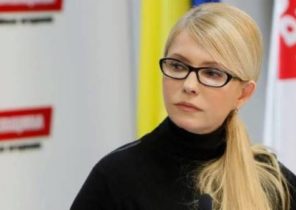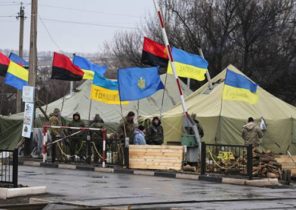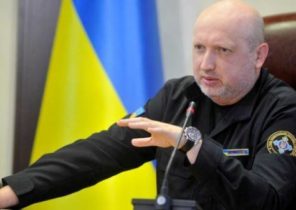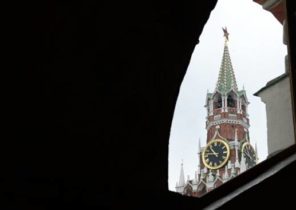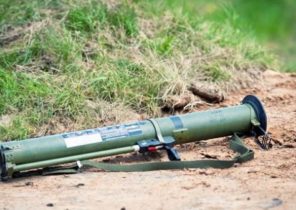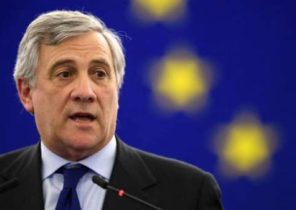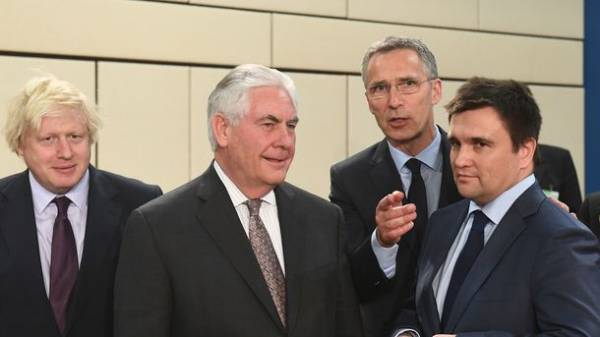
Ukraine is once again the center of attention of the international community. Of course, I would like to discuss our successes in carrying out reforms and combating corruption. But until Russia withdraws from the Donbass and Crimea, the issue of security will be a key topic of the global agenda.
On Friday in the course of the Commission Ukraine-NATO in Brussels discussed the situation in the Donbas. The extended meeting of the foreign Ministers of countries-members of NATO was moved from 5-6 April to 31 March that it was able to be a part of the Secretary of state Rex Tillerson. In the end, the Ministers once again condemned the aggressive policy of the Kremlin. And on Thursday at session of Council Russia-the NATO Alliance ambassadors urged the Kremlin to remove the “Iskander” from the Kaliningrad region. Hybrid threats in the context of Russian aggression against Ukraine, which threaten world security architecture, delivered at the session of the UN security Council on Friday, which gathered at the initiative of Kyiv. All except the Russian Ambassador, acknowledged that Russia is interfering in elections in the United States, Germany and France, hoping for an easing of sanctions. As for the Donbass, from 1 April there introduce another ceasefire. Hopes that Pro-Russian militants will abide by it, a little. So, a few hours before the ceasefire in the zone of military conflict in the East of Ukraine has deteriorated the situation. To put pressure on Russia, Ukraine, Germany and France will one front. A common position of Poroshenko, Merkel and Hollande agree next week on the phone.
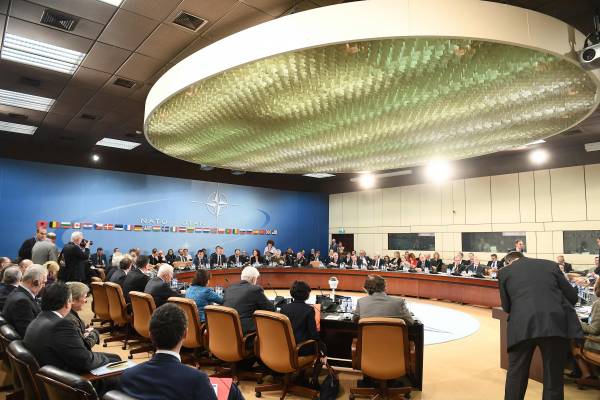
The meeting of the foreign Ministers of countries-members of NATO. AFP photo
Russia vs NATO the arms race. Consultations at the level of countries-members of the Alliance in Brussels opened on Thursday a meeting of the Council Russia-NATO. This is the fourth since the annexation of Crimea and the Russian military aggression in Donbas, the meeting at the ambassadorial level (Ministers of foreign Affairs of the Alliance in protest with his Russian counterpart to meet refuse). Illusions about the of the meeting no one had any. All the interviewed “Today,” the experts agreed that it was more of a meeting for the sake of meeting.
“The importance of the meeting lies in the fact that after a long break, the parties meet and thus declare readiness to resume the conversation. If there are weighty decisions, then, probably, in the future meetings. Of course, the biggest question mark remains Putin. If he wants a conversation and decisions, then they will. If you do not want, will not. And his whim dependent on different is not always rational factors…”, – said the “Today” Professor of political science at Rutgers University in Newark (new Jersey) Alexander Motyl.
On the agenda were a few key issues: the military doctrine of the Russian Federation “the West-2017” in Belarus, the situation in Eastern Ukraine, the situation security in Afghanistan, reduce military risk in Europe, as well as the purpose of deployment of Russian missile complexes “Iskander” in the Kaliningrad region and plans for their placement in the Crimea. A meeting of the Council Russia-NATO behind closed doors lasted more than four hours. According to the results reported by the NATO Secretary General Jens Stoltenberg. According to him, disagreements between NATO and Russia over events in Ukraine continues, so this topic was the first in the current debate. Jens Stoltenberg strongly criticized Russia’s actions on recognition of documents “DNR”/”LNR”, the introduction in the Donbass ruble zone and the seizure of the Ukrainian enterprises, and once again urged Russia to influence controlled by the militants.
“This was the first meeting of the NATO Council-Russia this year. The allies and Russia continue to have distinct differences in relation to the crisis in Ukraine and around it. This was the first topic that we covered. And the security situation still remains of serious concern. Violations of the ceasefire in the East of Ukraine has reached record levels. Active combat operations cease, and heavy weapons were not withdrawn. According to reports, the OSCE banned “Minsk” heavy weapons used almost twice a minute, and OSCE observers not allowed to do their job. Sometimes they even become targets,” said NATO Secretary General.
Russia’s envoy to NATO Alexander Grushko, in turn, criticized the Alliance for building up forces in the Baltic States and Poland (in the past year, NATO deployed four battalion – Ed.). According to him, it is fraught with the resumption of the arms race. However, he apparently forgot that in response to the deployment of the NATO battalions of Russia in the Kaliningrad region have placed missiles “Iskander”. Earlier “Today” already wrote that Western diplomats accuse Russia of violating the Treaty on the elimination of intermediate-and low-similarity, signed by Mikhail Gorbachev and Ronald Reagan in 1987. Missile complexes “Iskander” in the Kaliningrad have a radius up to 500 km away in the Kaliningrad region of the Russian Federation has deployed a coastal missile complex “Bastion” with a radius of up to 300 km, the Kremlin has announced plans to place in the Kaliningrad cruise missile, which Washington regards as exceeding the lower limit medium-range missiles under the Treaty on elimination of intermediate-range and thus in violation of the Treaty. Their potential range is 1500 km. in addition, the Kremlin plans to deploy “Iskander” in the Ukrainian Crimea.
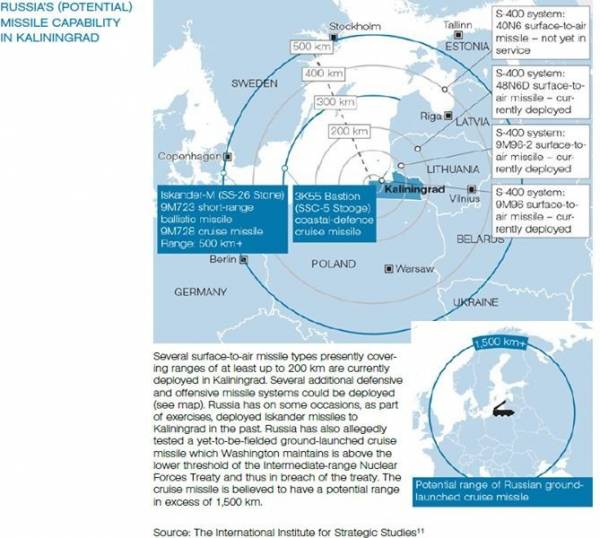
The missile Arsenal of Russia in Kaliningrad: what is and what plan to deploy
“Kaliningrad is Russian territory, and although the Crimea – no, Moscow is insisting that a Russian territory, and actually controls it. It was reported that Moscow had already deployed Iskanders in Kaliningrad, and is reportedly considering the possibility of their placement in the Crimea. And this problem will not be solved at the level of the NATO Council-Russia,” – said “Today,” former U.S. Ambassador to Ukraine John Herbst.
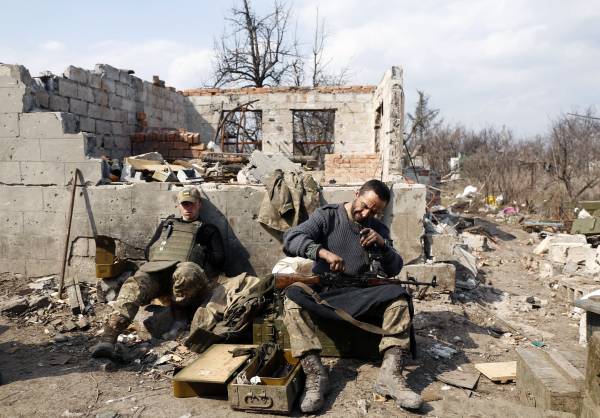
In the Donbass started another truce. AFP photo
Another truce – for how long? During the meeting of foreign Ministers of member countries of NATO in Brussels, where were present the Secretary of state Rex Tillerson, took place the meeting of the Commission Ukraine-NATO. On the agenda were the same issues that were discussed at the meeting of the Council Russia-NATO the security situation in the Donbass, which Russia refuses to provide Moscow’s recognition of the documents of the “DNR”/”LNR”, the introduction in the Donbass ruble zone and capture Pro-Russian militants Ukrainian enterprises.
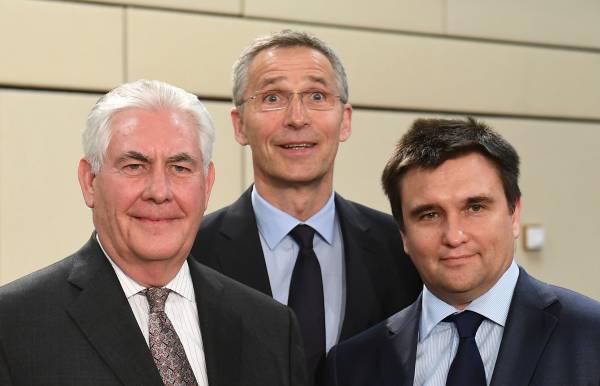
US Secretary of state, the Secretary General of NATO and Minister of foreign Affairs of Ukraine discussed the situation in the Donbas. AFP photo
“Special thanks to the allies that the Ukrainian issue is extremely important for practical support in the further struggle against Russian aggression in the Donbas and in the Crimea”, – wrote in his Twitter the head of the Ukrainian foreign Minister Pavlo Klimkin after the meeting in Brussels.
Special thanks to allies for keeping UA issue highly important, for practical support in further EN countering aggression in Donbas&Crimea pic.twitter.com/MtMpP2nJQZ
— Pavlo Klimkin (@PavloKlimkin) March 31, 2017.
NATO Secretary General Jens Stoltenberg, in turn, expressed support for Ukraine, and expressed concern that the security situation in the Donbass is now even worse than at the end of last year. The parties also discussed another ceasefire in the Donbas, which starts April 1. About this, as you know, agreed the participants of the Trilateral contact group (TAG) during a recent meeting in Minsk on 29 March.
“On the eve of Easter holidays the TAG welcomed the commitment of all participants of the Minsk process to ensure full compliance with the ceasefire regime, which will enter into force on 1 April. In addition, from April 1 to memorial day, scheduled for a significant acceleration of procedure of crossing of the line of contact on KPVV, in particular, it is planned to extend the work of crossing points in the morning and evening” – he wrote in Facebook Darka olifer – press Secretary of the President of Ukraine, representative of Ukraine Leonid Kuchma TAG.
A new phase of the truce in the Donbass Petro Poroshenko discussed with German Chancellor Angela Merkel in Malta, where he held an expanded summit of the European people’s party.
“Held a very effective negotiations with the German Chancellor, we agreed in the beginning of next week to hold telephone talks in a trilateral format with the participation of Chancellor Angela Merkel, French President Francois Hollande regarding the revitalization process in the Minsk format”, – said the President of Ukraine.
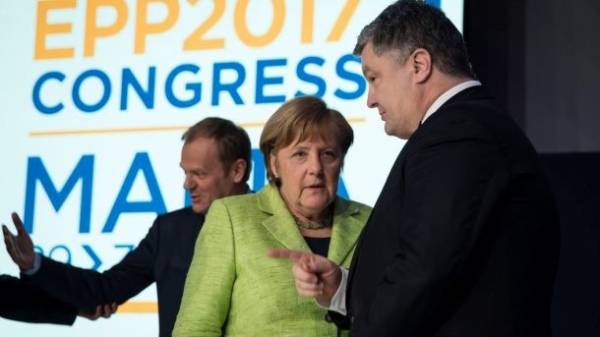
Poroshenko and Merkel in Malta. Photo: twitter.com/stsegolko
Interestingly, call the presidents of the three, without his Russian counterpart Vladimir Putin. That suggests either reluctance of the head of the Kremlin to engage in a dialogue, either about the need to coordinate positions exclusively in the triangle “Ukraine-Germany-France”. But despite this, Vladimir Putin has managed once again to speak out and the United States, and Ukraine.
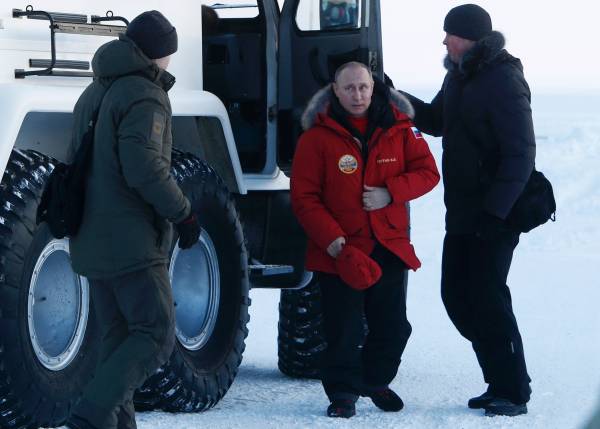
Putin in the Arctic. AFP photo
“As for Ukraine. In those States or in other places that we know for sure that the worse the relations between Russia and Ukraine, the better for them because it weakens Russia, it does not turn the integration processes which would strengthen Russia, including in the economic sphere,” said Putin during the international Arctic forum in Arkhangelsk, responding to a question about Russian-American relations.
Strongly disagree in the UN security Council. At the meeting dedicated to the topic of hybrid threats, almost everything except the permanent representative of the Kremlin, of course, criticized the stance of Vladimir Putin and Russia for its military aggression in Ukraine and interference in elections in the United States, Germany and France.
